The HyperTexts
William Blake's Children
William Blake did not have children of his own, at least as far as we know.
Although he was married, he and his wife were childless. But Blake certainly had
a wonderfully tender heart for children. He was a peerless child advocate who,
through his poetry and visual art, called for his fellow Englishmen to see and
respond to the the plight of children forced to work long, grueling, hazardous
hours providing virtual slave labor to unscrupulous businessmen. Among major writers,
perhaps only Charles Dickens rivals Blake as an illustrator of the plight of
orphans and street urchins.
I am dedicating this page and my poem "Orpheus" to the English Literature
students of Liceo Europeo Maria Luigia High School in Parma, Italy, and their
teacher Carla Maria Gnappi, who recited some of my poetry to her class while
discussing the works of William Blake. The poem and complete dedication appear
at the bottom of this page.
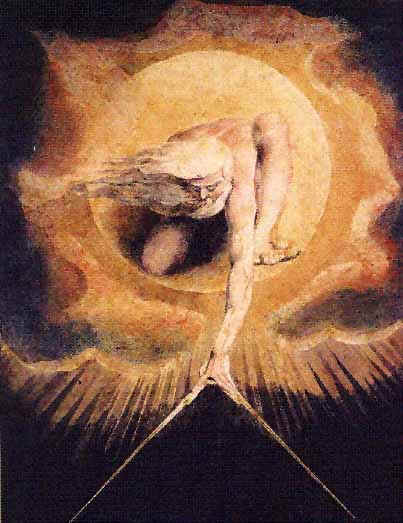
William Blake's "Ancient of Days"
Blake's Importance as a Children's Advocate and
Reformer
No great poet ever wrote more compassionately (or more
frequently) about children than William Blake. For instance, take this poem, one of
the loveliest lullabies in the English language:
Cradle Song
Sleep, sleep, beauty bright,
Dreaming in the joys of night;
Sleep, sleep; in thy sleep
Little sorrows sit and weep.
Sweet babe, in thy face
Soft desires I can trace,
Secret joys and secret smiles,
Little pretty infant wiles.
As thy softest limbs I feel
Smiles as of the morning steal
O'er thy cheek, and o'er thy breast
Where thy little heart doth rest.
O the cunning wiles that creep
In thy little heart asleep!
When thy little heart doth wake,
Then the dreadful night shall break.
Blake, the Child Advocate
Many children of Blake's time were treated like indentured servants, or
worse. For instance, in those dark days chimneys had to be cleaned, and since small
children were better able to squeeze into narrow chimneys than adults, unscrupulous
businessmen gave children as young as four the dirty, dangerous, sometimes-deadly task of inserting themselves into chimneys and slowly working their way upwards to
clean them. At the very best they would breathe in noxious fumes, coal dust and
ash; if they were really unlucky they might fall to be crippled or die. Very
young children were also forced to work grueling hours (up to 16 hours per day)
at highly dangerous mines and factories. Even if they weren't crippled or killed, they
had scant time or energy to learn or play. The majority of children who
worked in mines would die before reaching age 25.
William Blake was a penniless, powerless poet. What could he
possibly do about such horrors? What he did was quite simple: he wrote very
touching, very tender, very moving poems about the plight of the children of his
day. As we read
his poems together, please imagine what Blake might write today, if he saw
what the allegedly "great" nations of Israel, England and the United States have done to the
children of Gaza ...
![[Blake Print - Songs of Innocence]](images/William%20Blake%20Songs%20of%20Innocence.jpg)
William Blake's "Songs of Innocence"
Songs of Innocence: The Chimney Sweeper
When my mother died I was very young,
And my father sold me while yet my tongue
Could scarcely cry 'weep! 'weep! 'weep! 'weep!
So your chimneys I sweep, and in soot I sleep.
There's little Tom Dacre, who cried when his head,
That curled like a lamb's back, was shaved: so I said,
"Hush, Tom! never mind it, for when your head's bare,
You know that the soot cannot spoil your white hair."
And so he was quiet; and that very night,
As Tom was a-sleeping, he had such a sight,―
That thousands of sweepers, Dick, Joe, Ned, and Jack,
Were all of them locked up in coffins of black.
And by came an angel who had a bright key,
And he opened the coffins and set them all free;
Then down a green plain leaping, laughing, they run,
And wash in a river, and shine in the sun.
Then naked and white, all their bags left behind,
They rise upon clouds and sport in the wind;
And the angel told Tom, if he'd be a good boy,
He'd have God for his father, and never want joy.
And so Tom awoke; and we rose in the dark,
And got with our bags and our brushes to work.
Though the morning was cold, Tom was happy and warm;
So if all do their duty they need not fear harm.
Songs of Experience: The Chimney Sweeper
A little black thing in the snow,
Crying "'weep! 'weep!" in notes of woe!
"Where are thy father and mother? Say!"
"They are both gone up to the church to pray."
"Because I was happy upon the heath,
And smiled among the winter's snow,
They clothed me in the clothes of death,
And taught me to sing the notes of woe."
"And because I am happy and dance and sing,
They think they have done me no injury,
And are gone to praise God and his priest and king,
Who make up a heaven of our misery."
Blake wrote one collection of poems called Songs of Innocence, and
another called Songs of Experience. The poems of the first collection
look at the world from the vantage of childish innocence, while the poems of the
second collection view the same world through the eyes of experience. In both
poems above we can feel Blake's tender empathy for suffering children.
In both poems the child chimneysweeps are so young they can't pronounce the "s"
in "sweep" and so mispronounce their job titles. If the first poem seems
hopeful, it may be simply because children are inclined to be hopeful, due to
their innocence. The second poem is much darker and we sense Blake's fury with
religious people who go to church and "pray" while innocent children suffer and
die. What would he make of Jews and Christian today, who go to churches and
synagogues, and endlessly read and study the Bible, but don't know better than to allow the children of Gaza to suffer and
die needlessly? I have no doubt that he would think as little of them as he did of the
slavemasters who used and abused children in the "jolly old England"
of his day.
Here are three more poems from the same collections:
Songs of Innocence: Holy Thursday
'Twas on a Holy Thursday, their innocent faces clean,
The children walking two & two, in red & blue & green,
Grey-headed beadles walk'd before, with wands as white as snow,
Till into the high dome of Paul's they like Thames' waters flow.
O what a multitude they seem'd, these flowers of London town!
Seated in companies they sit with radiance all their own.
The hum of multitudes was there, but multitudes of lambs,
Thousands of little boys & girls raising their innocent hands.
Now like a mighty wind they raise to heaven the voice of song,
Or like harmonious thunderings the seats of heaven among.
Beneath them sit the aged men, wise guardians of the poor;
Then cherish pity, lest you drive an angel from your door.
Songs of Experience: Holy Thursday
Is this a holy thing to see,
In a rich and fruitful land,
Babes reduced to misery,
Fed with cold and usurous hand?
Is that trembling cry a song!
Can it be a song of joy?
And so many children poor,
It is a land of poverty!
And their sun does never shine.
And their fields are bleak & bare.
And their ways are fill'd with thorns
It is eternal winter there.
For where-e'er the sun does shine,
And where-e'er the rain does fall:
Babe can never hunger there,
Nor poverty the mind appall.
The "Holy Thursday" of Songs of Innocence describes
the celebration of the ascension of Jesus. On this day, children from the charity schools of
London were marched to a service at St. Paul's Cathedral. The beadles were the
men in charge of keeping order. In the last
stanza of the poem, the children are singing in the balcony and the beadles
are seated below them. The final line is an allusion to Hebrews 13:2, "Be not
forgetful to entertain strangers: for thereby some have entertained angels
unawares."
The "Holy Thursday" from Songs of Experience describes the same ceremony.
When Blake says "It is eternal winter there," he seems to be saying that a
church that denies innocent children food
and a decent life is utterly lacking in light and warmth.
Here is another poems about childlike innocence:
Songs of Innocence: The Lamb
Little Lamb, who made thee?
Dost thou know who made thee?
Gave thee life & bid thee feed,
By the stream & o'er the mead;
Gave thee clothing of delight,
Softest clothing, wooly, bright;
Gave thee such a tender voice,
Making all the vales rejoice?
Little Lamb, who made thee?
Dost thou know who made thee?
Little Lamb, I'll tell thee,
Little Lamb, I'll tell thee:
He is called by thy name,
For he calls himself a Lamb.
He is meek & he is mild;
He became a little child.
I a child & thou a lamb.
We are called by his name.
Little Lamb, God bless thee!
Little Lamb, God bless thee!
Blake, the Abolitionist
Blake was at the forefront of the British abolitionist movement, not only in
opposing slavery, but also in advocating the equality of the races, as we shall see
in the following poem (the full poem follows the plates and is much easier to
read):
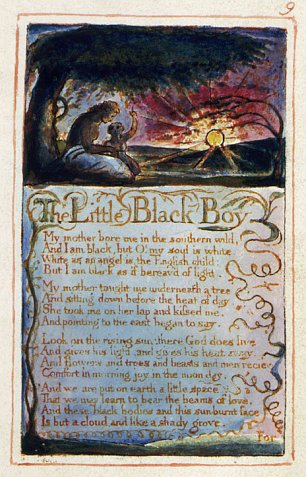
William Blake's "The Little Black Boy" (First Plate)
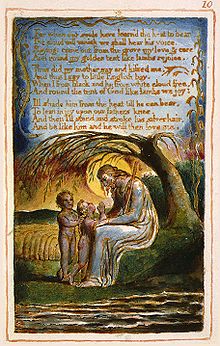
William Blake's "The Little Black Boy" (First Plate)
The Little Black Boy
My mother bore me in the southern wild,
And I am black, but O! my soul is white;
White as an angel is the English child,
But I am black, as if bereav'd of light.
My mother taught me underneath a tree,
And sitting down before the heat of day,
She took me on her lap and kissed me,
And pointing to the east, began to say:
Look on the rising sun: there God does live,
And gives his light, and gives his heat away;
And flowers and trees and beasts and men receive
Comfort in morning, joy in the noonday.
And we are put on earth a little space,
That we may learn to bear the beams of love;
And these black bodies and this sunburnt face
Is but a cloud, and like a shady grove.
For when our souls have learn'd the heat to bear,
The cloud will vanish; we shall hear his voice,
Saying: "Come out from the grove, my love & care,
And round my golden tent like lambs rejoice.''
Thus did my mother say, and kissed me;
And thus I say to little English boy:
When I from black and he from white cloud free,
And round the tent of God like lambs we joy,
I'll shade him from the heat, till he can bear
To lean in joy upon our father's knee;
And then I'll stand and stroke his silver hair,
And be like him, and he will then love me.
William Blake may have been, in one of the ultimate ironies, both England's
greatest heretic and its greatest visionary prophet. Together with Dante and Milton, Blake
completes a Trinity of great Christian poets, despite the fact that none of them
were Christians in the orthodox sense (Dante claimed to be saved by his lover
Beatrice and the pagan poet Virgil; Milton rather, than justifying the ways of
God to man, made him seem like an unjust tyrant while turning Lucifer, Adam and Eve
into Romantic heroes for
the ages; Blake denied the need for anyone to save him, least
of all the biblical god, whom he called "Nobodaddy"). Furthermore, I believe the
case can be made that Blake was England's greatest poet/artist, and perhaps the
world's. In another Trinity, along with Michelangelo and Dante Gabriel Rossetti,
Blake is one of three great visual artists
who were also highly accomplished poets. But Blake ranks higher than either Michelangelo or Rossetti as
a poet, so he deserves strong
consideration as the most important poet/artist of all time. And when his influence on
modern-day poets, songwriters, artists, filmmakers, novelists, cartoonists, graphic novelists, peace activists and child advocates is considered, a strong case
can be made for calling Blake the
most influential reformer of all time. After all, he was the first
genius to turn poetry and art into ideological weapons to be raised
defiantly against the establishment, making him a prime gladiator in the arena of
social change. Blake was the Thomas Paine, Thomas Jefferson and George
Washington of counter-culture, anti-establishment poetry
and art. He was a one-man revolution: a poetic James Dean, the original "Rebel with a
Cause." Blake also became a major influence on
poets like Walt Whitman, William Butler Yeats and Alan Ginsberg and
singer-songwriters like Bob Dylan, John
Lennon, Patti Smith, Kris Kristofferson, Joan Baez, Joni Mitchell and Bono. Jim
Morrison and the Doors named their group after Blake's "Doors of Perception."
Hell, even the best-known modern apologist for orthodox Christianity, C. S.
Lewis, called Blake a "great genius" despite his heresies. In yet another
wonderful irony, Blake's stirring poem "Jerusalem" became a well-loved Christian
hymn. It's one of my mother's favorites. When she discovered it missing from a
Baptist Hymnal (which ironically ended with hymn number 666), she added it to the
inside of the back cover, by hand.
Blake was also the first artist to graphically depict the horrors of slavery ... you
can see a slave ship departing in the background ...
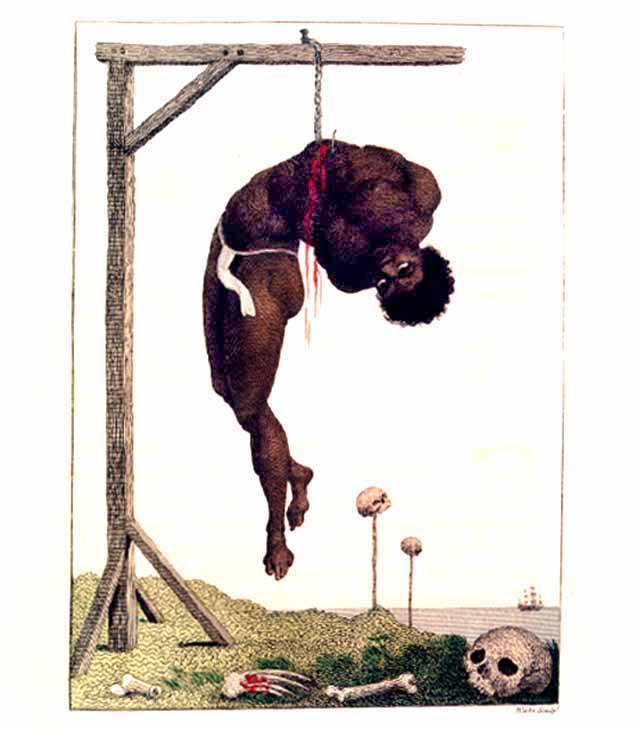
William Blake's "A Negro Hung Alive"
As I worked on this page, the lines of a song started playing in my
head: "Free your mind and the rest will follow. / Be colorblind. Don't be so
shallow." This call to enlightenment and tolerance by changing one's own mind
can be traced back to the visions of William Blake, who claimed to speak to
angels and called for a "Mental Fight" against the
dark forces ("Satanic Mills") of blind faith, ignorance, superstition, racism,
chauvinism and imperialism. A similar song that Blake might have inspired or
influenced is Michael Jackson's "Man in the Mirror."
The Sick Rose
by William Blake
O Rose, thou art sick.
The invisible worm
That flies in the night
In the howling storm
Has found out thy bed
Of crimson joy,
And his dark secret love
Does thy life destroy.
According to Blake, human society and its institutions were sick, and the cure
required a combination of revelation, imagination, right thinking, compassion,
fierce tenacity and love. He believed the black-robed priests of religion had
nailed a "thou shalt not" sign over the garden of earthly delights, robbing
adults of pleasure and children of hope. He vowed to not let his pen rest in his
hand until he had won the "Mental Fight" to transform the dreary London of his
day into a new Jerusalem. Today, as we witness the suffering inflicted on
innocent children all around the globe in the name of state, industry and
religion, it behooves us to consider joining that Mental Fight on the side of
Blake and his Rebel Angels.
Ah! Sunflower
by William Blake
Ah! sunflower, weary of time,
Who countest the steps of the sun,
Seeking after that sweet golden clime
Where the traveller’s journey is done;
Where the youth pined away with desire,
And the pale virgin shrouded in snow,
Arise from their graves and aspire;
Where my sunflower wishes to go.
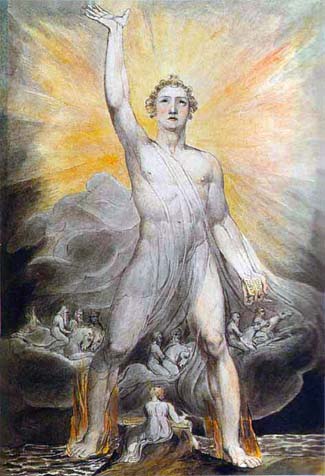
William Blake's "Angel of Revelation"
Only Michelangelo ranks with William Blake, among great artists who also wrote superior poetry,
in combined achievement. But Michelangelo didn't rock the civilized world to its
foundations the way Blake did, so Blake also gets my vote as the most important
artist of all time.
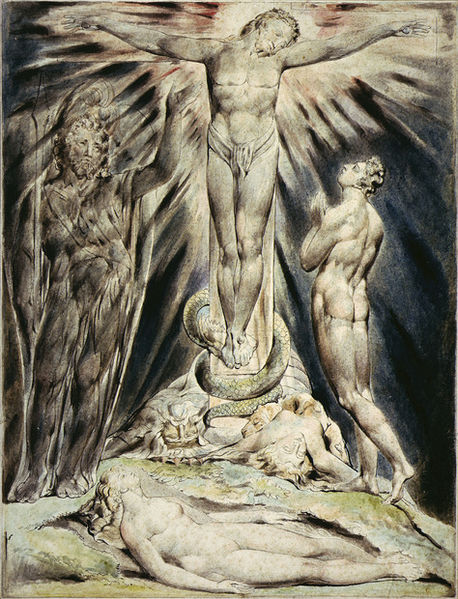
William Blake's "Michael Foretells the Crucifixion"
How, exactly, did Blake rock the foundations of the world? By being a social critic and reformer akin to the
Hebrew prophets. Here, for instance, is his bleak vision of the London of his day:
London
I wander thro' each charter'd street,
Near where the charter'd Thames does flow,
And mark in every face I meet
Marks of weakness, marks of woe.
In every cry of every Man,
In every Infant's cry of fear,
In every voice, in every ban,
The mind-forg'd manacles I hear.
How the Chimney-sweeper's cry
Every blackning Church appalls,
And the hapless Soldier's sigh
Runs in blood down Palace walls.
But most thro' midnight streets I hear
How the youthful Harlot's curse
Blasts the new-born Infant's tear
And blights with plagues the Marriage hearse.
Here, as in other of his poems, Blake reveals the schizophrenia of a society of
Bible-believing, church-going adults who inexplicably allowed children to work
as chimneysweeps: an always-dangerous, sometimes-deadly occupation. Today's
children of Gaza can no doubt sympathize with defenseless English children who
suffered and died in the shadows of those despicable churches. While Jews and
Christians raise hymns to God, and elect themselves the "Chosen Few,"
completely innocent Palestinian children live in abject fear and misery. Like
Blake, I find that appalling.
If you are a student, teacher, educator, peace
activist or just someone who cares and wants to help, please read
How Can We End Ethnic Cleansing and Genocide Forever?
and do what you can to make the world a safer, happier place for
children of all races and creeds.
Blake was also a fierce critic of
what Dwight D. Eisenhower would later call "the military-industrial complex." Blake
had a more evocative term for factories that churned out implements of war
and death: "Satanic mills." Blake is thus the forefather of virtually
every singer-songwriter who ever wrote a protest song. Before Blake, few poets
and minstrels had the nerve to criticize church and state. After Blake, many of
them would come to consider dissent a sacred task. Songwriters who followed in Blake's
footsteps as critics of the military-industrial complex include Woody Guthrie,
Peter Seeger, Bob Dylan, John
Lennon, Joni Mitchell, Joan Baez, Jim Morrison, Marvin Gaye, Billy Joel and Bruce Springsteen.
Blake and Social Progress
When I say that Blake was the most important poet and artist,
I am not suggesting that he wrote the greatest poems or created the
greatest works of visual art. What I am suggesting is that Blake had the most influence on other poets and artists, and on the
greater world, especially in terms of social progress. Much of the world's progress
depends on how it treats children, because they form the foundation of each new
generation of human beings. So Blake's advocacy of children's rights, at a time
when many children were treated like slaves (or were slaves) was of prime
importance in the development of the modern world.
Was Blake successful? Indeed, because today we have child labor laws, and most
children in Western nations don't get "real jobs" until age eighteen or older.
This gives them a considerable amount of time to play and learn, before they
assume adult responsibilities. Of course Blake was not the only child advocate among writers
and artists. Charles
Dickens was obviously also very influential, as were other influential
reformers. But Blake preceded Dickens by more than half a century, and when
Dylan met Lennon, they discussed Blake, not Dickens. Blake was the
first great writer to make children's rights a primary focus of his work. I
love and admire him for that. And as we will see together, he was also one of the first
abolitionists, creating some of the first graphic images of the horrors of
slavery.
W. H. Auden once said almost plaintively that "poetry makes nothing happen." But
if we consider the Bible to be poetry and the Hebrew prophets to be poets (much
of the Bible was recorded originally as poetry), it becomes obvious that a certain type of poetry can certainly
make all sorts of things happen. And of all the major Western poets, Blake comes closest to
the Hebrew prophets in demanding repentance and social reform.
Blake, the First Poet of Equality
Equality is a staggering concept. Perhaps Blake intuitively "got" it before most
of his contemporaries. Equality is counter-intuitive because there is no
equality in the wild. In a pride of lions the dominant male gets the choicest
meat and a harem of females. Even among herbivores the stronger males often dominate,
drive off or kill the weaker males.
But something fundamental had begun to change in human society: perhaps man had
overcome his environment to such an extent that the rules of nature were no
longer necessary. And if all human beings are "created equal," then
obviously kings, lords, clergy and businessmen have no right to use and abuse women and
children. A monumental "sea change" was about to take place, in the way Western
nations judged the people in power. In the past, a king might have been judged, to
some degree, by how he treated the men who "mattered." But after Blake and the
Romantics shook the foundations of the world, the people in power would also be
judged by how they treated women, children, serfs and slaves. While it would
take some time for the change to "take hold" (and indeed there is still
a good degree of "slippage"
today, as some Western nations still resist giving fully equal rights to
non-heterosexuals and Muslims), the suddenness of the change in the way poets
thought can quite easily be discerned in the work of Blake, Whitman and their
heirs.
Blake also spoke clearly and forthrightly for equality between the races in his
visual art. He depicted the horrors of racism and slavery more graphically than he did
any other horrors ...
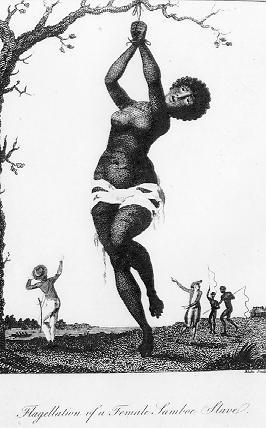
William Blake's "Flagellation of a Female Samboe Slave"
... but he seemed to go beyond that to "connect" the suffering of slaves with
the lot of suffering mankind, even poets, symbolized in the second image below by Los ...
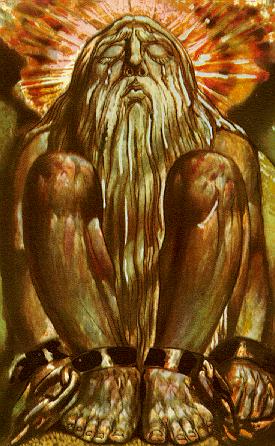
William Blake's "Urizen in Fetters, Tears streaming from His Eyes"
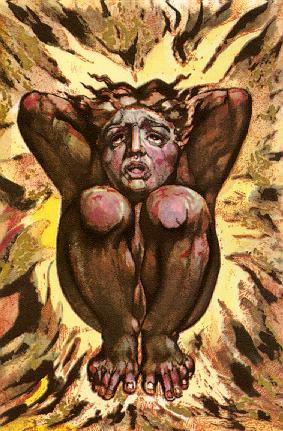
William Blake's "Los, Symbol of Poetic Genius, Consumed by Flames"
Blake and other early Romantic poets including William Wordsworth, Samuel Taylor
Coleridge and Robert Southey, opposed slavery. In 1796 John Gabriel Stedman, a
mercenary, published his memoirs of a five-year expedition against ex-slaves in
Surinam; his book included a number of engraved illustrations by Blake depicting
the horrifically cruel treatment of recaptured slaves. The first of these engravings has been "construed as an
explicit attack on the slave trade" because Blake depicted "the skulls of the
murdered slaves looking out over the sea to a slave ship in the distance while
the most recent victim of plantation cruelty swings on the gallows in the
foreground." These images were unique at that time for their graphic depiction of human suffering.
Stedman's book and Blake's illustrations became part of abolitionist literature.
According to the "William Blake Biography" the poet was a "prophet against empire" who opposed slavery
"over the course of his lifetime." Through his poetry and art "he was able both to counter pro-slavery propaganda
and to complicate typical abolitionist verse and sentiment with a profound and unique exploration of the effects
of enslavement and the varied processes of empire."
According to the same biography, Blake's Visions of the Daughters of Albion (1793) "explores the psychologically
damaging effects of enslavement upon its victims and also caricatures the political debate over
abolition in Britain. The triangular relationship between Oothoon the female
slave, Bromion the slave-driver, and Theotormon the jealous but inhibited former
lover, depicts the sufferings of those subjugated by the trade itself and mimics
the position of the pro-slavery, vested-interest lobby and that of wavering
abolitionists [who opposed slavery in theory without strongly opposing its
actual practice] ..."
The biography concludes: "Blake was among the few British writers
who actively advocated slave rebellion and believed that it was at the edges of
empire that true revolutions would occur."
Blake, the Advocate of Women and Free Love
In 1793's Visions of the Daughters of Albion, Blake "condemned the
cruel absurdity of enforced chastity and marriage without love and defended the
right of women to complete self-fulfillment." He abhorred the black-robed
priests of organized religion who erected a "Thou shalt not" sign over his
garden of earthly love ...
The Garden Of Love
by William Blake
I laid me down upon a bank,
Where Love lay sleeping;
I heard among the rushes dank
Weeping, weeping.
Then I went to the heath and the wild,
To the thistles and thorns of the waste;
And they told me how they were beguiled,
Driven out, and compelled to the chaste.
I went to the Garden of Love,
And saw what I never had seen;
A Chapel was built in the midst,
Where I used to play on the green.
And the gates of this Chapel were shut
And "Thou shalt not," writ over the door;
So I turned to the Garden of Love
That so many sweet flowers bore.
And I saw it was filled with graves,
And tombstones where flowers should be;
And priests in black gowns were walking their rounds,
And binding with briars my joys and desires.
Blake, the Prophet of Freedom and Tolerance
One of Blake's lifelong concerns was to free the soul and its natural energies from
the hidebound "reason" of organized religion. He hated the grimy, sooty effects
of the Industrial Revolution in England and looked forward to the establishment
of a New Jerusalem "in England's green and pleasant land." His personal religion was
freedom, tolerance and the pursuit of happiness, without artificial limitations
and impediments. To him, religious orthodoxy was like a speed bump in the middle
of racetrack. He had a heart of all human suffering. But perhaps his greatest
enduring legacy is his tender empathy for
children, and his fierce, passionate defense of them.
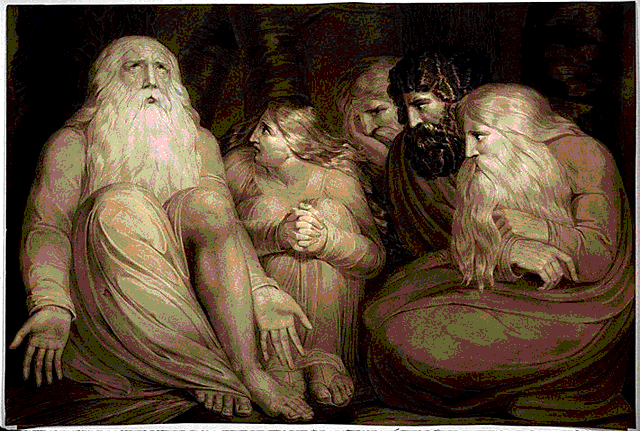
William Blake's "Job"
Orpheus
by Michael R. Burch
Dedicated to the English Literature students of the fifth class (quinta)
of Liceo Europeo Maria
Luigia High School in Parma, Italy, and their teacher Carla Maria Gnappi, who
recited some of my poetry to her class while discussing the works of William
Blake. The students are Giacomo, Giulia, Rebecca, Elisa, Leonardo, Leonardo,
Leonardo (three students with the same name), Alessia, Enrico, Giovanni, Nicola,
Raimonda, Deimante, Lavinia, Marta, Pietro, Virginia, Tis, Lorenzo, and
Benedetta. They are ages 17-18 and in their last year of high school.
I.
Many a sun
and many a moon
I walked the earth
and whistled a tune.
I did not whistle
as I worked:
the whistle was my work.
I shirked
nothing I saw
and made a rhyme
to children at play
and hard time.
II.
Among the prisoners
I saw
the leaden manacles
of Law,
the heavy ball and chain,
the quirt.
And yet I whistled
at my work.
III.
Among the children’s
daisy faces
and in the women’s
frowsy laces,
I saw redemption,
and I smiled.
Satanic millers,
unbeguiled,
were swayed by neither girl,
nor child,
nor any God of Love.
Yet mild
I whistled at my work,
and Song
broke out,
ere long.
Related pages: The Best Poems and
Art of William Blake, William Blake's
Angels, William Blake "Broken
Love"
The HyperTexts

![[Blake Print - Songs of Innocence]](images/William%20Blake%20Songs%20of%20Innocence.jpg)








